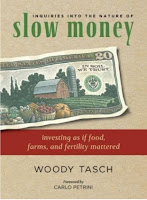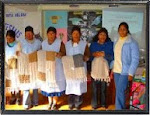Slow Money’s mission is:
- To support small food enterprises that preserve and restore soil fertility, appropriate-scale organic farming and local food communities;
- To catalyze increases in foundation grant-making and mission-related investing in support of sustainable and local economies; and,
- To incubate next-generation socially responsible investment strategies, integrating principles of carrying capacity, care of the commons, sense of place, cultural and biological diversity, and non-violence.
 e"
e" Woody Tasch, a 30-year veteran of the venture capital industry, is the father of a new movement in socially responsible investing. But it’s much, much more than that. His vision is nothing less than the restoration of the market economy by supporting tens of thousands of independent, local-first enterprises. From the Slow Money home page:
In a world in which there is no such thing as money that is too fast, a company that is too big, or intermediation that is too complex, we find ourselves asking:
Can investing in local food systems offer an authentic alternative?
If organic farming and small food enterprises are key to the health of the economy, society, and the soil, why do they receive so little funding from government, philanthropy, or capital markets?
Could a million American families get their food from CSA’s?
Here’s a video of Tasch explaining the Slow Money movement:














